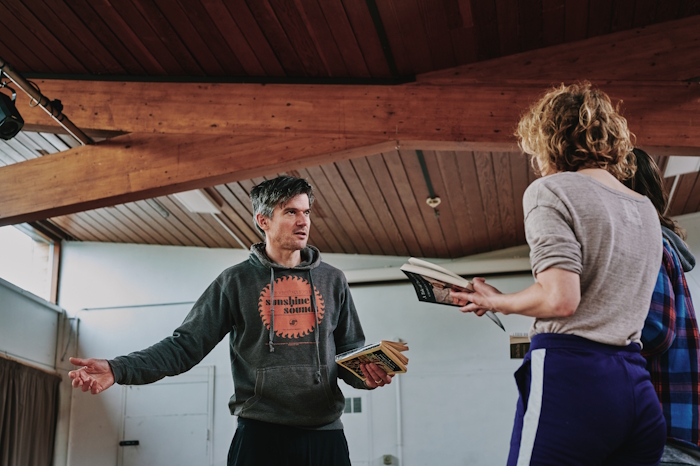Sam Wanamaker Playhouse, Shakespeare’s Globe, London
October 11, 2025 (as part of Dance Umbrella)
It was a most un-talk-like talk. With its wooden seating lined with dark red cushions and a small, carefully carved stage so close to the audience that the fourth wall becomes impossible to locate, the Sam Wanamaker Playhouse felt like the kind of space Ben Duke would enjoy.
He does not speak so much as perform. His body moves faster than his words, revealing that his mind is running at least ten thoughts at once. Sentences cut off. Ideas outrun language. It looks less like he is explaining something and more like he is testing whether words can keep up with his body.
Rather than telling us how to make text move, he seems to be proving that movement generates meaning before language does, and that words only follow under pressure. I often feel I cannot keep up with him, especially at the beginning. It feels as if he, like the rest of us, is not entirely sure what this talk is meant to be. He even says, I don’t know why I’m talking about making text move. But Duke never runs out of things to say.
In those opening minutes, he speaks in a rapid, almost page-flipping rhythm, leaping from literature to theatre, from the function of language to the labour of the body. At one moment, he pulls out a stack of prepared cards from his pocket, proof that he has prepared something. The audience laughs. I wonder what else is written on those cards, because he only uses a few.
Then he draws an invisible line across the stage, words downstage, close to the audience; dance pushed towards upstage, further away. He says he moves like a pendulum between language and body, and then he begins to demonstrate.
He stands in the dance half of the stage, eyes closed, moving, saying, I can’t see you, you don’t exist. As he drifts towards the language zone, he says, I’m starting to see you, I can see you now. Then he steps right to the edge, opens his eyes, looks at us, and suddenly laughs, I’ll just stay here then.
I do not know whether he realises what he is proving, but his body clearly does.
He never actually tells us how to make text move. As he jokes at the start, the phrase makes it sound as if he could command words. For him, language is a frame placed around movement, a boundary that assigns meaning to a phrase of dance. I think he simply wants the audience to tune into the right frequency. Like someone who speaks while gesturing with their hands, not because the gestures matter but because they are afraid you will not understand. It fits him well. He is not someone who enjoys having a fourth wall.
Dancer Miguel Altunaga later says that, in Cuba, there is no need to justify dance, you dance because you feel like it. It is only after coming to England that he encountered the idea that dance must explain itself. That gap says more about the distance between language and body than any technical discussion could.
Duke’s work often makes me think of film. His stage, like in an Alfred Hitchcock frame, has a habit of turning the watcher into the watched. The moment a performer glances back at the audience, you become sharply aware of your own act of watching. That is the intimacy of Ben Duke.
I do not know whether he wants us to understand what he is saying. The talk feels more like an invitation to stand at the threshold and watch him move back and forth across that unseen line. I do not remember the names he references. I only remember that line, and the way he wavers on it. Dancer Hannah Shepherd-Hulford also mentioned that she often gets lost in rehearsal, but that not knowing what she is doing makes her feel free.
As I leave the Globe, I see Duke in the lobby speaking with friends and colleagues. I do not go over to say hello. Language is not always the easiest thing for me either. But I am very much looking forward to his new work, to see how he will use his way of doing things to help Hamlet ask that question the whole world has already heard too many times.
For more about Ben Duke’s ‘The Last Hamlet,’ in which he sets out to change the way we look at Shakespeare’s anti-hero, click here.

